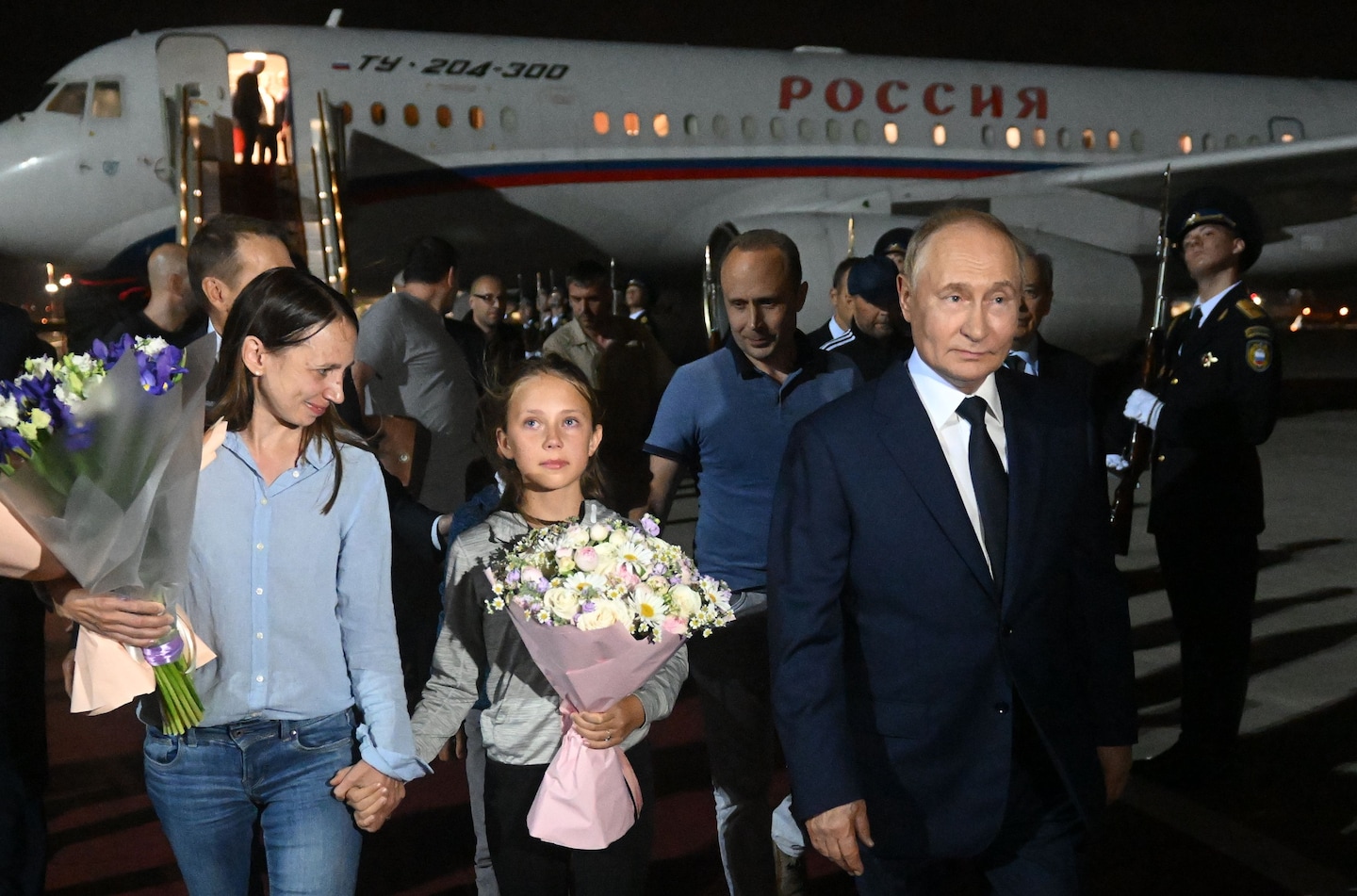As journalist Evan Gershkovich and other Americans released in a historic prisoner exchange arrived in Texas for medical treatment, and freed members of the Russian opposition reunited joyfully in Cologne, Germany, the Kremlin on Friday voiced triumph at bringing home elite spies and an operative convicted of murder.
“If we are talking about Ukraine and more complex international problems, this is a completely different matter,” Peskov said, asked by The Washington Post if the exchange was a sign that Russia would be ready to compromise and end the invasion of its neighbor.
“The principles there are completely different. They are the principles of the national interests of our country, the national security interests, and the work there is carried out in a different mode and according to different principles,” he said. Peskov said the exchange was negotiated by the CIA and Russia’s Federal Security Service, or FSB.
Tatyana Stanovaya, a Russia analyst and founder of R. Politik political consultancy, now based in France, said no one should expect a breakthrough in U.S.-Russia relations after the exchange, in which Russia released 16 prisoners, including some of Russia’s most prominent opposition figures. In return, Western nations released eight prisoners plus two children whose parents were captured Russian spies.
“There is no indication that the current exchange will facilitate peace talks concerning Ukraine,” Stanovaya said. “Instead, it reflects the current situation, where each side learns to live with mutual intransigence.”
Russian President Vladimir Putin at Moscow’s Vnukovo airport embraced Vadim Krasikov, who was freed from prison in Germany, where he was sentenced to life for killing a former Chechen rebel in broad daylight in a park in Berlin. In contrast at the U.S. homecoming at Andrews Air Force Base in Maryland, Gershkovich was embraced by President Biden and Vice President Harris before hugging his mother and lifting her into the air.
The Americans — Gershkovich, ex-Marine Paul Whelan and journalist Alsu Kurmasheva — were to be taken to the Brooke Army Medical Center at Joint Base San Antonio-Fort Sam Houston, the Wall Street Journal reported.
The images of the dual reunions, on airfields 4,855 miles apart, conveyed two distinct worlds that connected for a brief moment in an exchange that showcased on the one hand Western concern not only for its own jailed citizens but also for persecuted Russian dissidents, and on the other Russia’s celebration of covert operatives, criminals and a convicted assassin.
Peskov confirmed openly for the first time that Krasikov had been a member of the elite Alpha unit of the FSB even though Moscow had denied any involvement in Krasikov’s murder of killing of the Chechen commander, Zelimkhan Khangoshvili in 2019. Peskov also said that a member of Russian military intelligence was returned.
Asked about Putin’s hug for Krasikov, Peskov said the president greeted Krasikov “informally” because of Krasikov’s previous role as an Alpha operative. Putin, a former KGB agent, seemed singularly focused on winning Krasikov’s release.
“It is very important,” Peskov said, explaining Putin’s decision to personally greet the returning prisoners, doing so along with his top security chiefs and Defense Minister Andrei Belousov. “He choose to honor those who serve their country and those who after difficult trials got a chance to return to their homeland.”
At the airport, Putin highlighted some of the operatives’ “military” service to the Russian state, promising medals and indicating he would ensure they were well looked after.
“Especially to those who have military service, I want to thank you for your loyalty to your oath,” Putin said in a hall at the airport after presenting flowers to deep cover spy Anna Dultseva. She returned home with her husband, Artyom Dultsev, also a spy, and their two children. “You will all receive state awards. We will see each other again. We will talk about your future. But for now I just want to congratulate you on your return. Thank you.”
Critics of the Russian leader immediately seized on his warm welcome. Krasikov is “an FSB killer from one of the FSB’s most secretive and lethal units,” Christo Grozev, of the investigative site Bellingcat, who was a close associate of the late Russian opposition leader Alexei Navalny, posted Friday on X.
Bellingcat was first to reveal Krasikov’s true identity after he was arrested carrying a passport with a fake name, and Grozev helped formulate the initial idea of an exchange for Krasikov, originally designed to secure Navalny’s release. Instead, Navalny died in an Arctic prison in February in mysterious circumstances before the deal could be sealed,
Grozev, Navalny’s wife, Yulia Navalnaya, and other members of Navalny’s team have accused Putin of ordering him killed. The Kremlin has denied any role in his death.
Konstantin Sonin, economist and Russia analyst at the University of Chicago, wrote that even after analyzing Putin’s actions for 20 years “he still finds ways to dumbfound me.”
“Contract killers returning to the U.S.S.R. in Soviet times were greeted warmly — but secretly,” Sonin posted on X. “Putin seems no longer to care about any audience save for the FSB/spy community.”
Russia’s hawkish Foreign Ministry spokeswoman, Maria Zakharova drove home the contrast between Russia and the West, saying it illustrated Russia’s composure.
“What many people called ‘exchange,’ I would call a battle of composure,” Zakharova posted on the Telegram messaging platform on Friday. “The self-possession of the prisoners, the self-possession of the political authorities, the self-possession of the intelligence services. By all accounts we are the best.”

